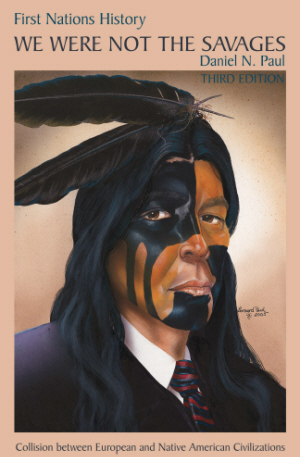 |
|
HOME |
|
CONTACT |
|
WEBSITE MAP |
|
MAP
Land Of The Mi'kmaq |
|
FIRST NATIONS HISTORY"We Were Not
The Savages" |
|
Click to Access Over 230 Pages of FIRST NATIONS History Highlights Paintings, Photos |
|
Newspaper Columns Written By
Daniel N. Paul
1994 - 2005 |
|
Links
First Nation Education, Business, History, etc., Websites |
|
Links
Non-First Nation Websites |
|
Journalist
And
Reviewer |
|
Consultant
Indian Act And Related Issues
|
|
Justice Of The Peace |
|
Daniel N. Paul Resume |
|
History Bits And Native American News Events |
|
Mi'kmaq First Nation Photos
************************ |
|
Benjamin Franklin
1706 - 1790
Franklin wrote the following after a large group of innocent Indians were massacred because of the actions of others from another Tribe:
"If an Indian injures me, does it follow that I may revenge that Injury on all Indians? "It is well known that Indians are of different Tribes, Nations and Languages, as well as the White People. "In Europe, if the French, who are White People, should injure the Dutch, are they to revenge it on the English, because they too are White People? "The only Crime of these poor Wretches seems to have been, that they had a reddish brown Skin, and black Hair; and some People of that Sort, it seems, had murdered some of our Relations. "If it be right to kill Men for such a Reason, then, should any Man, with a freckled Face and red Hair, kill a Wife or Child of mine, it would be right for me to revenge it, by killing all the freckled red-haired Men, Women and Children, I could afterwards any where meet with." |
|
|
 |
 |
 |
Chapter 1 | Chapter 2 | Chapter 3 | Chapter 4 | Chapter 5 | Chapter 6 | Chapter 7
Chapter 8 | Chapter 9 | Chapter 10 | Chapter 11 | Chapter 12 | Chapter 13 |Chapter 14
|
 
|
|
Chapter 5
We Were Not the Savages - The Treaty of 1725 and Proclamations
After 1713 the British had begun consolidating their hold over Acadia
by strengthening military placements, planning the subjugation of the
Mi’kmaq and initiating a drive to recruit reliable Protestant settlers. The latter
were needed to counterbalance what they considered the unreliability of the
hated Catholic Acadian settlers. But to assure that the colony was as peaceful
as possible during the exercise they temporarily took pains to accommodate
the Acadians.
However, the British plan for a short honeymoon with the Acadians changed
quickly after they failed in 1715 to convince the Mi’kmaq Chiefs to meekly
surrender to their rule. As mentioned, the Mi’kmaq, riled by the demands
made at that meeting, began taking some military actions. For the English this
development mandated that the courtship of the Acadians should continue
for a few more years, because having both Acadians and Mi’kmaq in a state
of agitation at the same time would not have been conducive to the consolidation
of control. However, as they despised the Acadians almost as much as the
Mi’kmaq, accommodating them for a little longer must have been a galling
experience. They probably took comfort from knowing that their humilation
at performing self-serving acts of kindness would one day be avenged.
That day was not long in coming. Once the British military had stabilized
the situation, English officials very quickly reverted back to their arrogant attitudes
of trying to force people to love them by abusing them. In hindsight,
it seems incredible that they would expect improvement in relationships with
the two communities while remaining unyielding toward their needs. However,
their belief that abuse and intimidation were the proper ways to achieve good
relations with people was unbending.
Motivated by this belief, they did something in 1722 that speaks volumes
about the lack of rights and justice under British rule. On August 1, the British
Governor of Acadia, Richard Philipp, issued a proclamation that not only
bespoke a disdain for democracy but also reflected how deeply rooted was their
paranoia about the close relationship between the Acadians and the Mi’kmaq.
Philipp’s edict made it illegal for Acadians to entertain a Mi’kmaq in any manner.
How strictly this proclamation was enforced is reflected in the minutes of
a Council meeting held on May 22, 1725:
The Honourable Lt. Governor, John Doucett, acquainted the board that
Prudane Robichau, senior inhabitant in the Cape, had entertained an Indian
in his house, contrary to His Excellency’s proclamation, dated August 1, 1722.
That he had therefore put him in irons and in prison amongst the Indians
for such heinous misdemeanour. This was to terrify the other inhabitants
|
 
|
|
PURCHASE INFORMATION
can be found on the right hand side of the HOME Page
**************************
|
|





